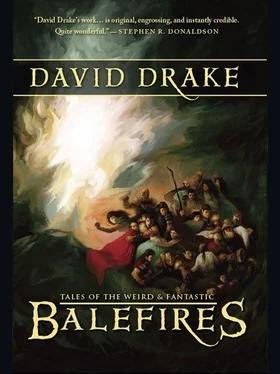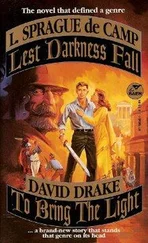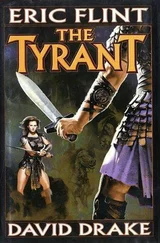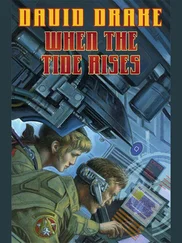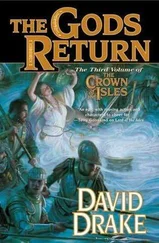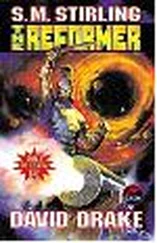David Drake - Balefires
Здесь есть возможность читать онлайн «David Drake - Balefires» весь текст электронной книги совершенно бесплатно (целиком полную версию без сокращений). В некоторых случаях можно слушать аудио, скачать через торрент в формате fb2 и присутствует краткое содержание. Жанр: Фантастика и фэнтези, на английском языке. Описание произведения, (предисловие) а так же отзывы посетителей доступны на портале библиотеки ЛибКат.
- Название:Balefires
- Автор:
- Жанр:
- Год:неизвестен
- ISBN:нет данных
- Рейтинг книги:5 / 5. Голосов: 1
-
Избранное:Добавить в избранное
- Отзывы:
-
Ваша оценка:
- 100
- 1
- 2
- 3
- 4
- 5
Balefires: краткое содержание, описание и аннотация
Предлагаем к чтению аннотацию, описание, краткое содержание или предисловие (зависит от того, что написал сам автор книги «Balefires»). Если вы не нашли необходимую информацию о книге — напишите в комментариях, мы постараемся отыскать её.
Balefires — читать онлайн бесплатно полную книгу (весь текст) целиком
Ниже представлен текст книги, разбитый по страницам. Система сохранения места последней прочитанной страницы, позволяет с удобством читать онлайн бесплатно книгу «Balefires», без необходимости каждый раз заново искать на чём Вы остановились. Поставьте закладку, и сможете в любой момент перейти на страницу, на которой закончили чтение.
Интервал:
Закладка:
Something that'd always puzzled me about the Mythos is why the Great Old Ones had human minions, since it was explicitly stated that if the Great Old Ones returned to Earth they would blast away all present life. Why would humans serve something that in human terms was absolute evil?
Writing a story is a very good way to focus logically on a question. I found an answer that satisfied me in human history. I set my story in the Congo Free State while it was still the personal possession of King Leopold II, but I could have picked any number of times or places. (Knowledge of history isn't an altogether cheerful accomplishment.) Things got a little better in the Congo after Leopold defaulted on a loan and the Belgian government took over the running of the colony, but only a little better.
At about the time this story was set, my friend Manly Wade Wellman was born in Portuguese West Africa (now Angola), just south of the Congo. (His parents were medical missionaries.) Manly retained a deep interest in Africa all his life, and his library contained many volumes about the continent.
Histories looking back at a period can explain what happened at a time and place, but contemporary works do something even more valuable (at least for a fiction writer): they explain what people at the time thought was happening. For the story's background I used books from Manly's library like Actual Africa-The Coming Continent, as well the works of missionaries protesting Belgian atrocities and modern overviews of the "development" of the Congo Basin.
Does that sound like a lot of research for a fantasy story? Well, maybe, but it's a habit I've kept throughout my career. I think it's stood me in good stead.
One writerly difficulty I had with the story was in deciding on the viewpoint character. I wrote about half the piece, stopped, and threw out the whole business to start again with a female scholar instead of a male adventurer as my main protagonist. Things fell into place then.
The title, by the way, is from the motto of The Christophers, a religious society: It is better to light one candle than to curse the darkness.
What with the research, the rewriting, and the fact that I was working a full-time job as Assistant Town Attorney for Chapel Hill at the time, "Than Curse the Darkness" took me five months to complete. This had an unexpected but very beneficial side-effect.
One night shortly after I'd sent the story to Ramsey, the phone rang. By "night," I mean my wife and I were asleep. The caller introduced himself as Roger Elwood (whom I knew of as an indefatigable SF/fantasy/horror anthologist but had never met or dealt with). He told me that he was now editing a line of novels, and he'd been given my name. Would I like to write novels?
I was absolutely dumbfounded. At the time I'd only sold about ten stories and not all those had appeared in print. I blurted that I appreciated his call, but I couldn't possibly write a novel: I'd just taken five months to write a novelette. Mr. Elwood said he regretted that, because he was prepared to offer me a two-book contract right now on the phone, if I could turn the first one in six months. I repeated my refusal, and he went elsewhere.
That's how I avoided the Laser Books debacle, which blighted (and in some cases destroyed) the careers of so many of those who took similar offers.
I think I'd have refused the offer under any circumstances, but my recent struggle to do a good job on "Than Curse the Darkness" armored me against the thought of "easy money." Writing isn't easy if you care about the result. Laser Books taught a lot of people not to care about their work. If there's a worse lesson to learn early in your career, I don't know what it is.
I had to wait several more years to sell a novel. I don't regret that delay.
"What of unknown Africa?" -H. P. Lovecraft
The trees of the rain forest lowered huge and black above the village, dwarfing it and the group of men in its center. The man being tied to the whipping post there was gray-skinned and underfed, panting with his struggles but no match for the pair of burly Forest Guards who held him. Ten more Guards, Baenga cannibals from far to the west near the mouth of the Congo, stood by with spears or Albini rifles. They joked and chattered and watched the huts hoping the villagers would burst out to try to free their fellow. Then killing would be all right…
There was little chance of that. All the men healthy enough to work were in the forest, searching for more trees to slash in a parody of rubber gathering. The Law said that each adult male would bring four kilograms of latex a week to the agents of King Leopold; the Law did not say that the agents would teach the natives how to drain the sap without killing the trees it came from. When the trees died, the villagers would miss their quotas and die themselves, because that too was the Law-though an unwritten one.
There were still many untouched villages further up the river.
"If you cannot learn to be out in the forest working," said a Baenga who finished knotting the victim to the post with a jerk that itself cut flesh, "we can teach you not to lie down for many weeks."
The Forest Guards wore no uniforms, but in the Congo Basin their good health and sneering pride marked them more surely than clothing could have. The pair who had tied the victim stepped back, nodding to their companion with the chicotte. That one grinned, twitching the wooden handle to unfurl the ten-foot lash of square-cut hippopotamus hide. He had already measured the distance.
A naked seven-year-old slipped from the nearest hut. The askaris were turned to catch the expression on the victim's face at the first bite of the chicotte, so they did not see the boy. His father jerked upright at the whipping post and screamed, "Samba!" just as the featheryhiss-crack! of the whip opened an eight-inch cut beneath his shoulder blades.
Samba screamed also. He was small even for a forest child, spindly and monkey-faced. He was monkey quick, too, darting among the Guards as they spun. Before anyone could grab him he had wrapped himself around the waist of the man with the whip.
"Wau!" shouted the Guard in surprise and chopped down with the teak whip handle. The angle was awkward. One of his companions helped with a roundhouse swing of his Albini. The steel butt-plate thudded like a mallet on a tent stake, ripping off the boy's left ear and deforming the whole side of his skull. It did not tear him loose from the man he held. Two Forest Guards edged closer, holding their spears near the heads so as not to hit their fellow when they thrust.
The whipped man grunted. One of the chuckling riflemen turned in time to see him break away from the post. The rough cord had cut his wrists before it parted. Blood spattered as he took two steps and clubbed his hands against the whip-wielder's neck.
The rifleman shot him through the body.
The Albini bullet was big and slow and had the punch of a medicine ball. The father spun backward and knocked one of the Baengas down with him. Despite the wound he stood again and staggered forward toward Samba. A pink coil of intestine was wagging behind him from the bullet's exit hole. Both the remaining rifles went off. This time, when the shots had sledged him down, five of the spearmen ran to the body and began stabbing.
The Baenga with the whip got up, leaving Samba on the ground. The boy's eyes were open and utterly empty. Lt. Trouville stepped over him to shout, "Cease, you idiots!" at the bellowing knot of spearmen. They parted immediately. Trouville wore a waxed moustache and a white linen suit that looked crisp save for the sweat stains under his arms, but the revolver at his belt was not for show. He had once pistoled a Guard who, drunk with arrogance and palm wine, had started to burn a village which was still producing rubber.
Читать дальшеИнтервал:
Закладка:
Похожие книги на «Balefires»
Представляем Вашему вниманию похожие книги на «Balefires» списком для выбора. Мы отобрали схожую по названию и смыслу литературу в надежде предоставить читателям больше вариантов отыскать новые, интересные, ещё непрочитанные произведения.
Обсуждение, отзывы о книге «Balefires» и просто собственные мнения читателей. Оставьте ваши комментарии, напишите, что Вы думаете о произведении, его смысле или главных героях. Укажите что конкретно понравилось, а что нет, и почему Вы так считаете.
